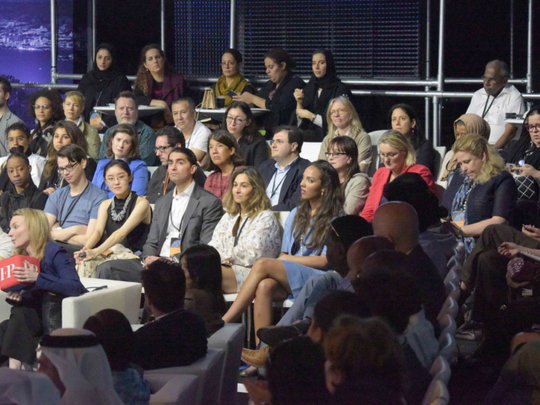
Abu Dhabi: The Culture Summit 2017 kicked off at Abu Dhabi’s Manarat Al Saadiyat on Monday bringing together leaders from the worlds of governments arts, and media, technology and policy in a forum that aimed to trigger thoughts and actions about how to solve some of the world’s complex issues using arts and culture.
The summit’s first day included panel discussions by experts from a wide range of backgrounds and from around the world such as Irena Bokova, Director-General, Unesco; Faryad Rwandizi, Iraq’s Minister of Culture; Sherrie Westin, EVP, Global Impact and Philanthropy; Octopizzo, hip-hop artist; Noura Al Kaabi, Minister of State, and an address by Shaikh Nahyan Bin Mubarak Al Nahyan, Minister of Culture and Knowledge Development.
Shaikh Nahyan’s address emphasised the important role artists play around the world in uniting people and placing pressing topics such as climate change, human rights and even the power of technology at the forefront of discussions.
“I speak my words in English because it is most likely to be understood by most people here today. But, artists speak in a far more universal language, a beautiful and stimulating language that is understood all over the world. The arts connect us … the arts establish bonds and unite us,” he said.
Monday’s panel discussions presented a large number of topics, over 25-minute sessions, including what is the role of an artist, destruction of culture by extremists such as Daesh and how that could be changed, refugees and funding for arts and culture.
While the panellists and topics changed throughout the day, the message from the participants, who have come to the UAE from over 80 countries, remained the same, and that was the importance and relevance of arts and culture in today’s world.
The Unesco director-general spoke about how there were two groups of people in the world, one that wants to preserve culture and another that wants to destroy it. “Art is a necessity, that’s why groups like Daesh and Taliban destroy culture,” Bokova said.
Al Kaabi, who is also the Media Zone Authority twofour54 chairperson, discussed how most of the content watched globally was made in a few places including Hollywood. She highlighted the importance of creating locally produced content not just as a way of preserving culture but also as a tool to introduce outsiders to this region’s customs.
“We know about many things that are in your culture … we know your president, your food. But what do you know about our culture?” she said.
She emphasised that while there was nothing wrong with watching programmes made elsewhere, there had to be some balance.
The Iraqi Minister of Culture told the audience it was difficult to discuss how to defeat extremism when the only means used so far to battle extremists was the military.
“We cannot do the job using only the military. We have to engage in a different way … we should use culture,” Rwandizi said.
The event’s first day also saw a very intimate performance by Sandeep Das who played the tabla (an Indian percussion instrument). As he explained the various aspects of his act, such as the words he meant the tabla to speak as he played, it provided the audience with a unique insight into this Indian form of music.
Around 20 performances are expected to take place over the course of the summit, which will run until April 13.
Tomorrow’s topic will focus around how culture can bring social change as well as honouring the event’s cultural diplomat award winners.
The Culture Summit 2017 is organised by the Abu Dhabi Tourism and Culture Authority in conjunction with The FP Group, publishers of Foreign Policy magazine, and TCP Ventures, LLC, a cultural advisory firm.
For more information visit www.culturesummitabudhabi.com.










